四川省宜宾三中2014-2015学年高二上学期期中考试模拟英语试卷(无答案)
- 格式:doc
- 大小:129.50 KB
- 文档页数:15
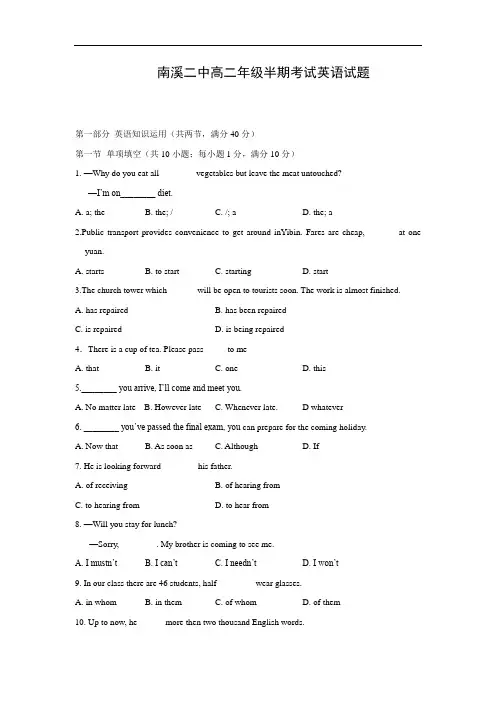
南溪二中高二年级半期考试英语试题第一部分英语知识运用(共两节,满分40分)第一节单项填空(共10小题;每小题1分,满分10分)1. —Why do you eat all ________vegetables but leave the meat untouched?—I’m on________ diet.A. a; theB. the; /C. /; aD. the; a2.Public transport provides convenience to get around inYibin. Fares are cheap,_______ at oneyuan.A. startsB. to startC. startingD. start3.The church tower which ______ will be open to tourists soon. The work is almost finished.A. has repairedB. has been repairedC. is repairedD. is being repaired4.There is a cup of tea. Please pass _____to meA. thatB. itC. oneD. this5.________ you arrive, I’ll come and meet you.A. No matter lateB. However lateC. Whenever late. D whatever6. ________ you’ve passed the final exam, you can prepare for the coming holiday.A. Now thatB. As soon asC. AlthoughD. If7. He is looking forward ________his father.A. of receivingB. of hearing fromC. to hearing fromD. to hear from8. —Will you stay for lunch?—Sorry, ________. My brother is coming to see me.A. I mustn’tB. I can’tC. I needn’tD. I won’t9. In our class there are 46 students, half ________ wear glasses.A. in whomB. in themC. of whomD. of them10. Up to now, he______ more then two thousand English words.A. learntB. learnC. had learntD. has learnt第二节完形填空(共20小题; 每小题1.5分,满分30分)阅读下面短文,掌握其大意,然后从31-50各题所给的四个选项(A,B,C和D)中,选出一个最佳选项,并在答题卡上将该项涂黑。
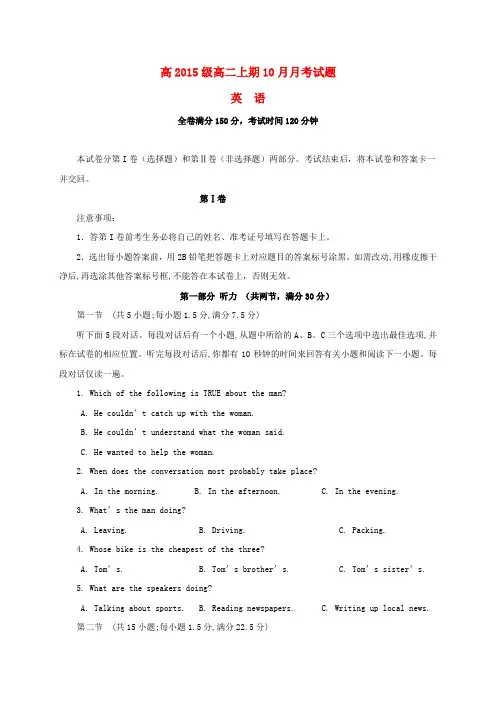
高2015级高二上期10月月考试题英语全卷满分150分,考试时间120分钟本试卷分第I卷(选择题)和第Ⅱ卷(非选择题)两部分。
考试结束后,将本试卷和答案卡一并交回。
第Ⅰ卷注意事项:1.答第I卷前考生务必将自己的姓名、准考证号填写在答题卡上。
2.选出每小题答案前,用2B铅笔把答题卡上对应题目的答案标号涂黑。
如需改动,用橡皮擦干净后,再选涂其他答案标号框,不能答在本试卷上,否则无效。
第一部分听力(共两节,满分30分)第一节(共5小题;每小题1.5分,满分7.5分)听下面5段对话。
每段对话后有一个小题,从题中所给的A、B、C三个选项中选出最佳选项,并标在试卷的相应位置。
听完每段对话后,你都有10秒钟的时间来回答有关小题和阅读下一小题。
每段对话仅读一遍。
1. Which of the following is TRUE about the man?A. He couldn’t catch up with the woman.B. He couldn’t understand what the woman said.C. He wanted to help the woman.2. When does the conversation most probably take place?A. In the morning.B. In the afternoon.C. In the evening.3. What’s the man doing?A. Leaving.B. Driving.C. Packing.4. Whose bike is the cheapest of the three?A. Tom’s.B. Tom’s brother’s.C. Tom’s sister’s.5. What are the speakers doing?A. Talking about sports.B. Reading newspapers.C. Writing up local news.第二节(共15小题;每小题1.5分,满分22.5分)听下面5段对话或独白。
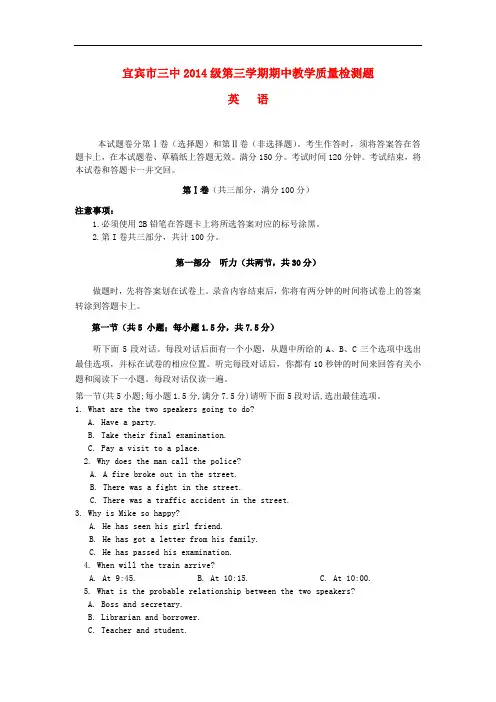
宜宾市三中2014级第三学期期中教学质量检测题英语本试题卷分第Ⅰ卷(选择题)和第Ⅱ卷(非选择题)。
考生作答时,须将答案答在答题卡上,在本试题卷、草稿纸上答题无效。
满分150分。
考试时间120分钟。
考试结束,将本试卷和答题卡一并交回。
第Ⅰ卷(共三部分,满分100分)注意事项:1.必须使用2B铅笔在答题卡上将所选答案对应的标号涂黑。
2.第I卷共三部分,共计100分。
第一部分听力(共两节,共30分)做题时,先将答案划在试卷上。
录音内容结束后,你将有两分钟的时间将试卷上的答案转涂到答题卡上。
第一节(共5 小题;每小题1.5分,共7.5分)听下面5段对话。
每段对话后面有一个小题,从题中所给的A、B、C三个选项中选出最佳选项,并标在试卷的相应位置。
听完每段对话后,你都有10秒钟的时间来回答有关小题和阅读下一小题。
每段对话仅读一遍。
第一节(共5小题;每小题1.5分,满分7.5分)请听下面5段对话,选出最佳选项。
1. What are the two speakers going to do?A. Have a party.B. Take their final examination.C. Pay a visit to a place.2. Why does the man call the police?A. A fire broke out in the street.B. There was a fight in the street.C. There was a traffic accident in the street.3. Why is Mike so happy?A. He has seen his girl friend.B. He has got a letter from his family.C. He has passed his examination.4. When will the train arrive?A. At 9:45.B. At 10:15.C. At 10:00.5. What is the probable relationship between the two speakers?A. Boss and secretary.B. Librarian and borrower.C. Teacher and student.第二节(共15小题;每题1.5分,共22.5分)听下面5段对话或独白。
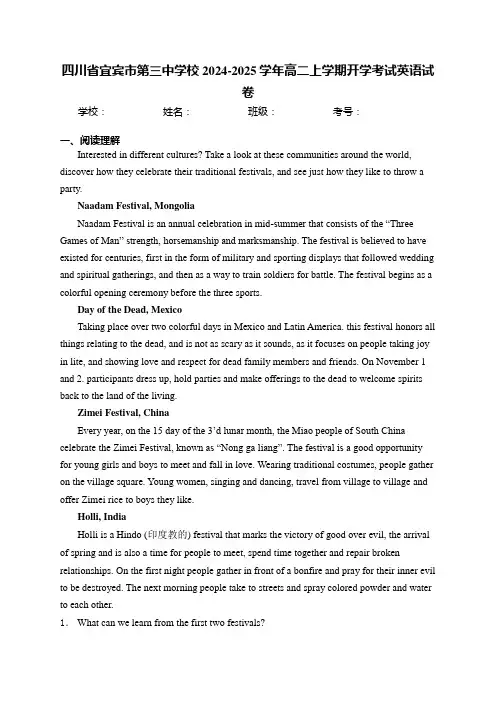
四川省宜宾市第三中学校2024-2025学年高二上学期开学考试英语试卷学校:___________姓名:___________班级:___________考号:___________ 一、阅读理解Interested in different cultures? Take a look at these communities around the world, discover how they celebrate their traditional festivals, and see just how they like to throw a party.Naadam Festival, MongoliaNaadam Festival is an annual celebration in mid-summer that consists of the “Three Games of Man” strength, horsemanship and marksmanship. The festival is believed to have existed for centuries, first in the form of military and sporting displays that followed wedding and spiritual gatherings, and then as a way to train soldiers for battle. The festival begins as a colorful opening ceremony before the three sports.Day of the Dead, MexicoTaking place over two colorful days in Mexico and Latin America. this festival honors all things relating to the dead, and is not as scary as it sounds, as it focuses on people taking joy in lite, and showing love and respect for dead family members and friends. On November 1 and 2. participants dress up, hold parties and make offerings to the dead to welcome spirits back to the land of the living.Zimei Festival, ChinaEvery year, on the 15 day of the 3’d lunar month, the Miao people of South China celebrate the Zime i Festival, known as “Nong ga liang”. The festival is a good opportunity for young girls and boys to meet and fall in love. Wearing traditional costumes, people gather on the village square. Young women, singing and dancing, travel from village to village and offer Zimei rice to boys they like.Holli, IndiaHolli is a Hindo (印度教的) festival that marks the victory of good over evil, the arrival of spring and is also a time for people to meet, spend time together and repair broken relationships. On the first night people gather in front of a bonfire and pray for their inner evil to be destroyed. The next morning people take to streets and spray colored powder and water to each other.1. What can we learn from the first two festivals?A. Naadam Festival has a history of several thousand years.B. Day of the Dead is celebrated in mid-summer every year.C. The celebrations of Naadam Festival have changed over time.D. On Day of the Dead, the dead will visit the land of the living.2. Who will most probably be interested in Zimei Festival?A. People who like sports.B. Young men who are unmarried.C. People believing in Hindo.D. Children enjoying playing with water. 3. Where is this text most probably taken from?A. A travel booklet.B. A science magazine.C. An academic article.D. A geography book.Ms. McIntyre, 38, worked as a publisher. She suffered brain cancer and her health got worse despite some medical treatment. But she realized that in a way, she was luckier than some other people. She had insurance to help pay for her medical care. But Ms. McIntyre and her husband, Mr. Gregory, knew that many people with cancer face tough decisions because of the costs of medical care and wind up owing far more than they can pay.Though her health was failing, Ms. McIntyre decided to help pay off the medical debts of as many people as she possibly could. The couple began donating money to a group called RIP Medical Debt, which is committed to working to pay off the unpaid medical debts of others. The group can pay off medical bills for about 100 times less money than they cost. In other words, for every 100 donated, the group can pay off 10,000 in unpaid medical bills.Unfortunately, Ms. McIntyre passed away before long. Mr. Gregory posted a message for Ms. McIntyre on he r social media accounts. “If you’re reading this, I have passed away,” the post began. Then the post explained, “To celebrate my life, I’ve arranged to buy up others’ medical debts and then destroy the debts.”The couple had set up a page on a website to raise money for this purpose. They had hoped to raise about $20,000. Nevertheless, Ms. McIntyre’s last post attracted a lot of attention. The donations on her web page quickly passed the total goal. In less than a week, the site had raised 10 times more than expected and the donations are still coming in. By November 22, 2023, Ms. McIntyre’s web page had raised over $627,000, or enough money to pay off about $60 million in medical debts.Mr. Gregory planned a special event in December to celebrate Ms. McInty re’s life and to announce how many millions of dollars of medical debts her efforts had paid for.4.Why did Ms. McIntyre feel luckier than some other people?A. The doctors eventually cured her.B. Her disease didn’t become worse.C. She had security about medical care.D. She had a decent job before being ill.5.How did Ms. McIntyre and her husband help others?A. By paying for their daily debts.B. By giving away money to them.C. By purchasing medical insurance for them.D. By ridding them of debts from treatments.6.What is paragraph 4 mainly about?A. The couple’s anticipation.B. The public involvement.C. The operation of a website.D. The increase of medical debts.7.Which of the following words can best describe Ms. McIntyre?A. Influential and understanding.B. Humorous and elegant.C. Cautious and promising.D. Enthusiastic and adaptable.If your partner gets down on one knee to propose, or you get a call with the job offer, your reaction might be to shout it from the rooftops. But new research suggests that keeping good news a secret before telling someone else could make people feel more energized.“Decades of research on secrecy suggest it is bad for our well-being. However, this work has only examined keeping secrets that have negative effects for our lives. Is secrecy inherently bad for our well-being or do the negative effects of secrecy tend to originate from keeping negative secrets?” asked lead researcher of the latest research Michael Slepian, PhD, a professor of business at Columbia University.In the experiment, some participants were asked to reflect on the good news they kept secret, while others reflected on good news that was not secret, and then rated how energized the news made them feel and whether they intended to share the news with someone else. The researchers found that the participants who reflected on their positive secrets reported feeling more energized than the participants who thought about their good news that was not secret.The research nuances our understanding of the science of secrets. Negative secrets tend to deplete us and have also been linked to anxiety and depression. Positive secrets, however, seem to have an energizing effect and make people alive. One factor could be that people often have different motivations for keeping good news to themselves. Those with positivesecrets were much more likely to keep quiet for internal reasons, not because they felt any outside pressures.“People sometimes go to great l engths to plan revealing a positive secret to make it all the more exciting. This kind of surprise can be intensely enjoyable, but surprise is the most fleeting of our emotions, ” Slepian said. “Having extra time days, weeks or even longer-to imagine the j oyful surprise on another person’s face allows us more time with this exciting moment, even if only in our own minds.”8.What did Michael Slepian think of the previous research on secrecy?A. One-sided.B. Pointless.C. Convincing.D. Pioneering.9.In the experiment, some participants were more energized because ______.A. they were optimistic and cheerful.B. they were free from secrets.C. they had undisclosed positive secrets.D. they had shared good news with others. 10.What does the underlined word “deplete” in paragraph 4 mean?A. Spoil.B. Exhaust.C. Confuse.D. Panic.11.According to the last paragraph, what did Slepian suggest readers do?A. Never reveal a secret casually.B. Let your imagination run wild.C. Be creative when surprising others.D. Delay sharing a positive secret.They say procrastination (拖延) is the thief of time — actually deadlines are. New research has found that if you want someone to help you out with something, it is best not to set a deadline at all. But if you do set a deadline, make it short.Professor Stephen Knowles tested the effect of deadline length on task completion for their research. Participants were invited to complete an online survey concerning a charity donation. They were given either one week, one month, or no deadline to respond. Professor Knowles says although the topic of the survey was about charity, the results are true of any situation where someone asks another person for help.The study found responses to the survey were lowest for the one-month deadline and highest when no deadline was specified (明确规定). No deadline and the one-week deadline led to many early responses, while a long deadline appeared to give people permission to procrastinate, and then forget. Professor Knowles wasn’t surp rised to find that specifying a shorter deadline increased the chances of receiving a response compared to a longer deadline. However, he did find it interesting that they received the most responses when no deadline was specified.“We interpret this as evidence that specifying a longer deadline, as opposed to a shortdeadline or no deadline at all, removes the urgency to act,” he says. “People therefore put off undertaking the task, and since they are inattentive or forget, postponing it results in lower response rates.”He says of the research that it is possible that not specifying a deadline might still have led participants to assume that there is an unspoken deadline. Professor Knowles hopes his research can help reduce the amount of procrast inating people do. “Many people procrastinate. They have the best intentions of helping someone out, but just do not get around to doing it.”12.Why did Professor Knowles do the research?A.To study the role a deadline plays in procrastination.B.To find out whether people are interested in charity.C.To attract public attention to the effects of procrastination.D.To test the effect of procrastination on task completion.13.What most likely leads to procrastination?A.No deadlines.B.Short deadlines.C.Specific deadlines.D.Long deadlines.14.Why do people procrastinate when given a long deadline?A.They oppose the deadline.B.They are unwilling to act.C.They lack a sense of urgency.D.They are too busy to remember.15.Which of the following is the best title for the text?A.Procrastination — the Thief of TimeB.Procrastination — an Urgent Problem to SolveC.Deadline — a Result of ProcrastinationD.Deadline — the Key to Reducing Procrastination二、七选五16.Perseverance isn’t easy. But before you blame your lack of willpower, consider this: Building mental strength is similar to building physical strength. In just a few minutes each day, you can train your brain to think differently, manage your emotions, and behave productively. ①______②______think about three things you are grateful for in your life. It could be as simple as the clean water that you drink. Write in a gratitude journal, list the things you feel grateful for over dinner, or make it a habit to find what you’re thankful for before you g o to bed. Over time, being grateful becomes a second nature.It’s impossible to stay strong when you’re thinking about something that happened last week or horrible things going to happen tomorrow. ③______. Therefore, it’s of great significance to be able to concentrate on the present. With regular practice, you’ll increase the ability to focus.It can be tempting to wait until you feel ready to make a change. But waiting until you feel good about yourself before you take action could have the opposite effect. Instead, when you change your behavior, your thoughts and your emotions will follow. So when you’re sad, put your shoulders back and smile, and you’ll feel better. ④______ Every day is a chance to develop some mental strength. Simple, short exercises performed over time will help you build mental strength. ⑤______ Feeling sorry for yourself and giving up after your first failure are just a few of the bad habits that could discourage you from building your mental strength.A The only time you can make changes is right now.B. With regular exercise, you’ll build your mental strength.C. You can stay away from the bad habits by regular training.D. Mental strength has a lot in common with physical strength.E. You can physically change your brain by making gratitude a habit.F. Pay attention to the bad habits that keep you out of mental strength.G. Always remember feelings of confidence won’t come out of nowhere.三、完形填空(15空)When I was 24, I moved to America, 11,000 kilometers away from my homeland. Thisbecome part of the community.unfamiliar land.17. A. tough B. dangerous C. exciting D. rewarding18. A. happiness B. interest C. loneliness D. guilt19. A. upset B. cost C. challenged D. changed 20. A. drawn B. compared C. driven D. devoted 21. A. played B. hid C. slept D. relaxed 22. A. reject B. control C. cover D. mirror23. A. praise B. sympathy C. forgiveness D. trust24. A. escape from B. adapt to C. get around D. search for 25. A. bond B. plan C. habit D. skill26. A. guidance B. independence C. confidence D. patience 27. A. courage B. acceptance C. assistance D. curiosity 28. A. innovation B. insight C. investigation D. investment 29. A. leaving B. widening C. bridging D. creating 30. A. open B. simple C. strong D. innocent31. A. responsibility B. security C. belonging D. freedom四、语法填空32.Flower arrangement is the① ________ (combine) of several elements to produce visually pleasing display of fresh, silk, or dried flowers. General design principles include unbalance and harmony, ②________ often involves the use of light, space, and accent. Different parts of the world use various design techniques for flower arrangement.The art of Chinese traditional flower arrangement, originally③________ (serve) as offerings (供品) at temples and decorations in the palace, has survived over the centuries. “With ④________ history of more than 3,000 years, the image of flower arrangement sometimes is still limited bunches of flowers in flow er shops. That’s a pity.” Zhang Yan, a master of the art, said.⑤ ________, in recent years Zhang has been devotedly popularizing the traditional flower arrangement, hoping people will be familiar ⑥________ the art, takepride in its long history and hold an ability⑦ ________ (appreciate) the beauty in life.In Zhang’s view, Chinese traditional flower arrangement is not only a decoration, but a form of psychological treatment⑧ ________ (true) effective for modern busy bees. The art emphasizes simplicity, and the arranger must decide on⑨ ________ is really necessary in his or her work and life. When the arranger fully⑩ ________ (understand) what they want, the healing effect of the art will be realized.33.apology n.歉意 ________________v.道歉34.anxious adj.焦急的 ________________ n.焦虑35.explain v.解释 ________________ n.解释36.satisfied adj.满意的 ________________ n.满足37.success n.成功 ________________ v.达到目的,成功做成38.defend v.防御 ________________ n.防御39.free v.释放 adv.免费 ________________ n.自由40.high adj.高的 adv.在高处 ________________ n.身高,高度41.imagine v.想象,设想 ________________ n.想象,想象力42.length n.长,长度 ________________v.(使)变长五、翻译题43.一听到这一消息,成群的新生兴奋地离开了他们的父母。
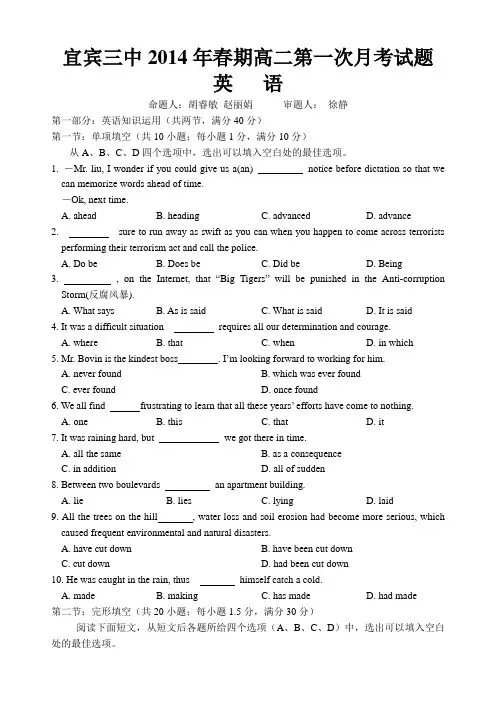
宜宾三中2014年春期高二第一次月考试题英语命题人:胡睿敏赵丽娟审题人:徐静第一部分:英语知识运用(共两节,满分40分)第一节:单项填空(共10小题;每小题1分,满分10分)从A、B、C、D四个选项中,选出可以填入空白处的最佳选项。
1. -Mr. liu, I wonder if you could give us a(an) notice before dictation so that we can memorize words ahead of time.-Ok, next time.A. aheadB. headingC. advancedD. advance2. sure to run away as swift as you can when you happen to come across terrorists performing their terrorism act and call the police.A. Do beB. Does beC. Did beD. Being3. , on the Internet, that ―Big Tigers‖will be punished in the Anti-corruption Storm(反腐风暴).A. What saysB. As is saidC. What is saidD. It is said4. It was a difficult situation requires all our determination and courage.A. whereB. thatC. whenD. in which5. Mr. Bovin is the kindest boss . I‘m looking forward to working for him.A. never foundB. which was ever foundC. ever foundD. once found6. We all find frustrating to learn that all these years‘ efforts have come to nothing.A. oneB. thisC. thatD. it7. It was raining hard, but we got there in time.A. all the sameB. as a consequenceC. in additionD. all of sudden8. Between two boulevards an apartment building.A. lieB. liesC. lyingD. laid9. All the trees on the hill , water loss and soil erosion had become more serious, which caused frequent environmental and natural disasters.A. have cut downB. have been cut downC. cut downD. had been cut down10. He was caught in the rain, thus himself catch a cold.A. madeB. makingC. has madeD. had made第二节:完形填空(共20小题;每小题1.5分,满分30分)阅读下面短文,从短文后各题所给四个选项(A、B、C、D)中,选出可以填入空白处的最佳选项。
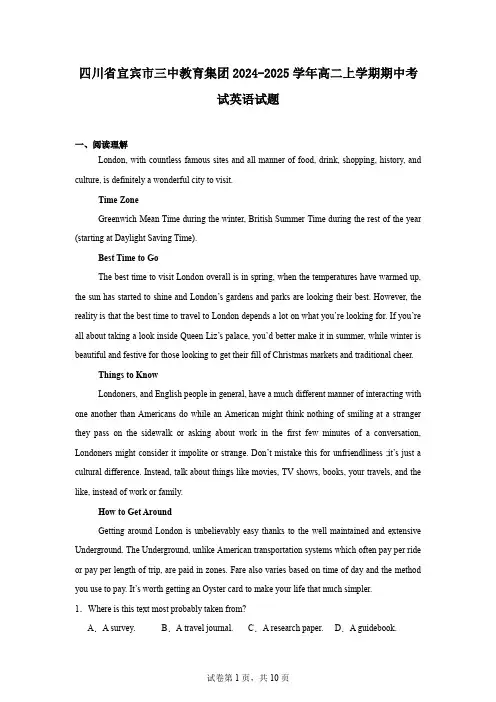
四川省宜宾市三中教育集团2024-2025学年高二上学期期中考试英语试题一、阅读理解London, with countless famous sites and all manner of food, drink, shopping, history, and culture, is definitely a wonderful city to visit.Time ZoneGreenwich Mean Time during the winter, British Summer Time during the rest of the year (starting at Daylight Saving Time).Best Time to GoThe best time to visit London overall is in spring, when the temperatures have warmed up, the sun has started to shine and London’s gardens and parks are looking their best. However, the reality is that the best time to travel to London depends a lot on what you’re looking for. If you’re all about taking a look inside Queen Liz’s palace, you’d better make it in summer, while winter is beautiful and festive for those looking to get their fill of Christmas markets and traditional cheer.Things to KnowLondoners, and English people in general, have a much different manner of interacting with one another than Americans do while an American might think nothing of smiling at a stranger they pass on the sidewalk or asking about work in the first few minutes of a conversation, Londoners might consider it impolite or strange. Don’t mistake this for unfriendliness ;it’s just a cultural difference. Instead, talk about things like movies, TV shows, books, your travels, and the like, instead of work or family.How to Get AroundGetting around London is unbelievably easy thanks to the well-maintained and extensive Underground. The Underground, unlike American transportation systems which often pay per ride or pay per length of trip, are paid in zones. Fare also varies based on time of day and the method you use to pay. It’s worth getting an Oyster card to make your life that much simpler.1.Where is this text most probably taken from?A.A survey.B.A travel journal.C.A research paper.D.A guidebook.2.When is the best time to visit London for people who enjoy a lively atmosphere?A.Spring.B.Summer.C.Autumn.D.Winter.3.Which of the following is a suitable topic for starting a conversation with Londoners?A.Daily entertainments.B.Future plans.C.Personal relationships.D.Annual incomes.When her students ask what she was like at their age, Tiffany Marconi opens up about her high school experience. Her family were often on the move, which made her feel lost. “I was just kind of all over the place. My teachers in high school really helped me discover who I was and feel comfortable with myself,” Marconi says.Marconi is instrumental in building a program in Wheat on Warrenville Unit District 200. Through her “Intro to Teaching” classes, Marconi is drawing high school students to the profession (职业) at a time when a national teacher shortage makes headlines.One of the goals of the program is to give teens real-world experiences and opportunities to explore careers while they’re in high school. The curriculum is set through the College of DuPage, but Marconi creates a student-centered classroom. At the end of the term, students design their own classroom on an individual level and in small groups as a team-based challenge.Marconi doesn’t avoid talking about the realities — all the positives and some of the struggles of being a teacher. “Yes, I would love all of them to come back and teach,” Marconi says. “But I just hope honestly that it helps them figure out if they want to be a teacher, and if not, that’s OK. The one thing I always tell my students: You need to find a job, something that you love and that you are excited to do when waking up every day.”4.Why did Marconi feel lost in her high school?A.She scored low marks.B.Her family moved a lot.C.Her teachers were strict.D.She went to school alone.5.What does the program that Marconi works for aim to do?A.Help students get along well with each other.B.Encourage students to attend top colleges.C.Build more student-centered classrooms.D.Inspire students to go for teaching jobs.6.What do the students need to do at the end of the term?A.Design a classroom in their own way.B.Look for a well-paid job as expected.C.Prepare themselves for the interviews.D.Discuss their curriculum with teachers.7.Which of the following best describes Marconi as a teacher?A.Quiet.B.Impatient.C.Caring.D.Humorous.It was a method favoured by the inventor Thomas Edison and the artist Salvador Dali. Waking from a nap exactly at the point before deep sleep in an effort to inspire creativity.Edison held a metal ball in his hand so that if he nodded off he would drop it and the sound would wake him. For Dali, it was a key landing on a plate. Now scientists have found that they might have been onto something.Researchers at the Paris Brain Institute studied people’s ability to find a hidden rule in a maths puzzle. Identifying the trick would make solving the problem far simpler but to do so required thinking creatively. The scientists found that participants who had been woken just before falling into a deep sleep, using a technique like that used by Edison and Dali, were more likely to find the shortcut.This “twilight zone” is known as non-rapid eye movement sleep stage 1, or N1. Scientists described it like an exaggerated form of mind-wandering, where dream-like thoughts fill the mind. It is thought that as people start to disengage (脱离) from their environment they can “freely watch their minds wander, while maintaining their ability to identify creative sparks (火花)”.For the study 103 people were given a maths problem to solve. To reach the final answer they had to apply the rules step by step but, unknown to them, a “hidden rule” would allow them to bypass most of the steps and get to the solution much more quickly. The results showed that 83 percent of those in the N1 group had found the shortcut, compared with 31 percent in the group who were awake and 14 percent of those in a deep sleep.Researchers conclude that the brain activity common to the twilight zone between sleep andwakefulness set off creative sparks. “Although the neural mechanisms (神经机制) involved are not yet known, our findings suggest that there is a creative sweet spot within the twilight zone,” said Dr Thomas Andrillon, co-author of the study.8.Why did the author mention “a metal ball” and “a key” in Paragraph 2?A.To clarify a method.B.To explain a theory.C.To present a concept.D.To make a comparison.9.What can we learn about “the twilight zone” from the text?A.It prevents your mind from wandering.B.It determines what your dreams will be like.C.It is known as rapid eye movement sleep stage.D.It is a state of being half asleep and half awake.10.What does “the shortcut” in Paragraph 5 refer to?A.The maths problem.B.The final answer.C.The hidden rule.D.The added step.11.What attitude may Dr Thomas Andrillon hold to the technique used by Edison and Dali?A.Doubtful.B.Critical.C.Indifferent.D.Favorable.In the world of water, 2021 was another year for the record books. Parts of Western Europe suffered from deadly floods while large areas of the southwestern United States remained locked in a massive drought.One might think that our impressive water management would safeguard society from such catastrophic events. Yet when it comes to water, the past is no longer a good guide for the future and most of the water engineering is unprepared for consequences of increasingly occurring extreme weather. One of the most alarming wake-up calls came from the city of Cape Town, where the water taps of 4 million residents were nearly forced to be shut off after severe drought dried up its reservoir (水库).Appealing as it might be, the solution is not to further build bigger and higher dams (水坝) that often result in more disastrous flooding. Rather, it is to work more with natural processes.The Netherlands avoided major damage from the historic floods in July 2021 thanks to itsrecently completed project, which gives river room to spread out by redirecting floodwaters into wetlands, lowering parts of the stormy river by more than a foot. Agricultural practices offer another strategy. Scientists have found that boosting organic matter in the soil by 1% can increase the soil’s water-holding capacity by up to 18,000 gallons per acre, creating flexibility to both intense rains and dry periods. This means farmland practices such as the planting of cover crops can not only raise output but improve water management.Solutions don’t come easily, but they are key to a livable future. While it’s too late to avoid the impacts of climate change, we can avoid the worst of those impacts by investing more in such nature-based water solutions.12.Why is Cape Town mentioned in paragraph 2?A.To show the existing water management is impressive.B.To show the reservoir was of no practical use.C.To show how awful it was without tap water.D.To show new water management is in need.13.What can we learn from Paragraph 4?A.Improving soil’s water-holding ability is practical.B.The river’s water level was reduced to over a foot.C.The Netherlands was free from flood damage.D.Boosting organisms reduced the production.14.Which of the following water projects might win the author’s favor?①Restoring healthy soil①Filling wetlands①Strengthening dams①Making room for riverA.①①B.①①C.①①D.①①15.What can be the best title for the text?A.Water disaster: a threat out of control.B.Investment in water: a key to the future.C.Nature-based solution: a way out for water.D.Good news: farming practices working well.Do you have an important or favorite memory from the past? Perhaps it was clapping forgoals, or seeing rainbow picture in the window. Shared memories can connect you to others.16How does memory work?Scientists believe there are two levels of memory. One is short-term or working memory, which stays in our brain for only 15-30 seconds. The other level is long-term or permanent memory, which can be stored for days, or even years.Motor-skill memories help you remember how to ride a bike; factual memories help you to remember faces. 17 Emotional memories recall how you felt about something and can be strong and powerful. Remembering the sadness of missing your friends during lockdown, and being happy and excited to see them again afterwards, are emotional memories. They are long term and can sometimes last a lifetime.Why are memories important?18 Information such as which school you go to and who your friends are is stored inside your brain, ready for when you need it. Memories can also help you manage feelings. Heidi, 12, told The Week, “If I miss seeing my granny and granddad, I remember staying with them in Devon. It makes me feel happy, like when I was there.”“When people think of shared experience, what usually comes to mind is being with close others, such as friends or family, and talking with them,” Erica Boothby, a social-psychologist, said. By telling a funny or embarrassing story we share feelings of joy or recognition of difficulties overcome. By sharing similar or not-o-similar experiences, we empathize (产生共鸣) with and understand one another better.19Kim Roberts, a professor who runs the Child Memory Lab in Canada, believes focusing on happy memories will help you feel more positive. 20 Roberts says it’s also helpful to remember that if you missed out on your last term at school, or birthday celebrations, then your friends did too. One day you will look back on this year as an important memory that you all share.A.When do memories fade?B.Can memories help wellbeing?C.Memories tell you the story of yourself.D.Emotional memories are usually sad ones.E.These types of memories can be short or long term.F.If you have difficult memories, though, it is important to talk about them.G.By sharing our memories, we can feel closer to other people and more positive.二、完形填空There is a big difference between offering to help and helping. Almost all of us are guilty about the following 21 : Someone talks about a problem, and we answer with 22 words, “Be sure to give me a call if I can help.” But we often do nothing to help.Once I was in the situation where I 23 these kinds of offers of help — my son just started studying abroad. During those particular days, all I could 24 was the trouble my son would possibly face. It was a very 25 experience. However, there were very few who offered something really helpful.26 , I had one close friend who took action rather than just saying to offer help. She called, “I know you must be going crazy. I think you need to get away from your 27 .” She had already called a few of our friends and 28 a big dinner out. It was a wonderful night. I hadn’t even known how much I needed that 29 until I was there.After that 30 , I decided I’d 31 her example and reach out to others. I’ve been 32 though rejected at times. But I was amazed when I cheered people up. So 33 asking someone if they need help, and offer something 34 then and there. It is a way to show the power of 35 in an uncertain world.21.A.rule B.situation C.problem D.excuse 22.A.confusing B.honest C.sincere D.careful 23.A.received B.performed C.missed D.understood 24.A.turn to B.learn from C.complain about D.think about 25.A.valuable B.painful C.exciting D.fresh 26.A.Basically B.Disappointedly C.Luckily D.Gradually 27.A.worries B.doubts C.anger D.sadness 28.A.attended B.earned C.joined D.prepared29.A.pity B.break C.anxiety D.enthusiasm 30.A.adventure B.education C.experiment D.experience 31.A.follow B.appreciate C.ignore D.change 32.A.cheated B.respected C.refused D.accepted 33.A.stop B.finish C.keep D.try 34.A.small B.rapid C.specific D.right 35.A.patience B.kindness C.confidence D.courage三、语法填空阅读下面材料,在空白处填入适当的内容(1个单词)或所给单词的正确形式。
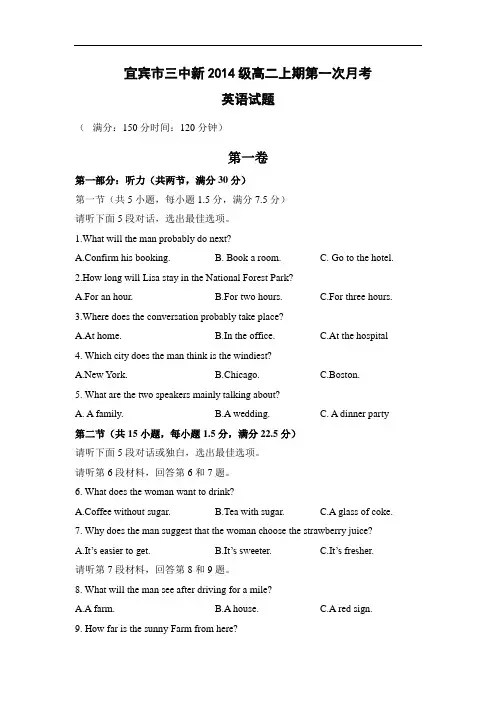
宜宾市三中新2014级高二上期第一次月考英语试题(满分:150分时间:120分钟)第一卷第一部分:听力(共两节,满分30分)第一节(共5小题,每小题1.5分,满分7.5分)请听下面5段对话,选出最佳选项。
1.What will the man probably do next?A.Confirm his booking.B. Book a room.C. Go to the hotel.2.How long will Lisa stay in the National Forest Park?A.For an hour.B.For two hours.C.For three hours.3.Where does the conversation probably take place?A.At home.B.In the office.C.At the hospital4. Which city does the man think is the windiest?A.New York.B.Chicago.C.Boston.5. What are the two speakers mainly talking about?A. A family.B.A wedding.C. A dinner party 第二节(共15小题,每小题1.5分,满分22.5分)请听下面5段对话或独白,选出最佳选项。
请听第6段材料,回答第6和7题。
6. What does the woman want to drink?A.Coffee without sugar.B.Tea with sugar.C.A glass of coke.7. Why does the man suggest that the woman choose the strawberry juice?A.It’s easier to get.B.It’s sweeter.C.It’s fresher.请听第7段材料,回答第8和9题。
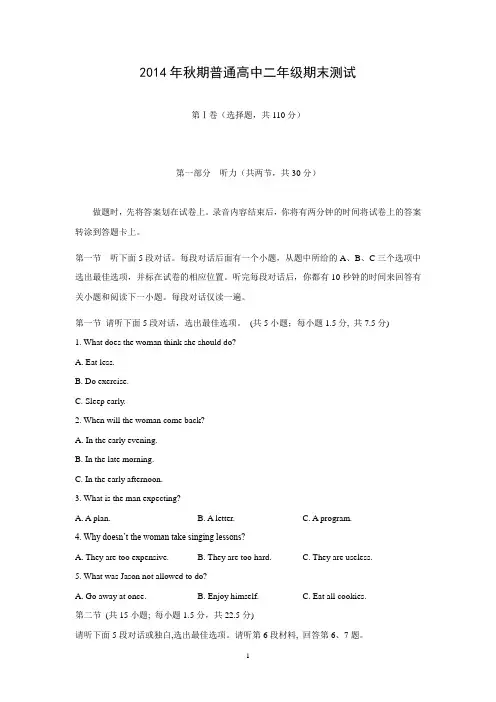
2014年秋期普通高中二年级期末测试第Ⅰ卷(选择题,共110分)第一部分听力(共两节,共30分)做题时,先将答案划在试卷上。
录音内容结束后,你将有两分钟的时间将试卷上的答案转涂到答题卡上。
第一节听下面5段对话。
每段对话后面有一个小题,从题中所给的A、B、C三个选项中选出最佳选项,并标在试卷的相应位置。
听完每段对话后,你都有10秒钟的时间来回答有关小题和阅读下一小题。
每段对话仅读一遍。
第一节请听下面5段对话,选出最佳选项。
(共5小题;每小题1.5分, 共7.5分)1. What does the woman think she should do?A. Eat less.B. Do exercise.C. Sleep early.2. When will the woman come back?A. In the early evening.B. In the late morning.C. In the early afternoon.3. What is the man expecting?A. A plan.B. A letter.C. A program.4. Why doesn’t the woman take singing lessons?A. They are too expensive.B. They are too hard.C. They are useless.5. What was Jason not allowed to do?A. Go away at once.B. Enjoy himself.C. Eat all cookies.第二节(共15小题; 每小题1.5分,共22.5分)请听下面5段对话或独白,选出最佳选项。
请听第6段材料, 回答第6、7题。
6. What does the woman need?A. A paid vacation.B. Her pay in advance.C. Extra hours to work.7. Who might Simms be?A. The woman’s boss.B. The woman’s hus band.C. The woman’s brother.请听第7段材料,回答第8、9题。
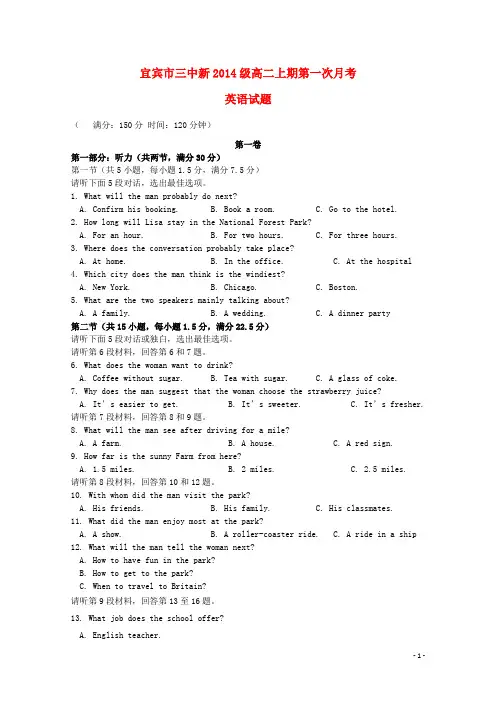
宜宾市三中新2014级高二上期第一次月考英语试题(满分:150分时间:120分钟)第一卷第一部分:听力(共两节,满分30分)第一节(共5小题,每小题1.5分,满分7.5分)请听下面5段对话,选出最佳选项。
1. What will the man probably do next?A. Confirm his booking.B. Book a room.C. Go to the hotel.2. How long will Lisa stay in the National Forest Park?A. For an hour.B. For two hours.C. For three hours.3. Where does the conversation probably take place?A. At home.B. In the office.C. At the hospital4. Which city does the man think is the windiest?A. New York.B. Chicago.C. Boston.5. What are the two speakers mainly talking about?A. A family.B. A wedding.C. A dinner party第二节(共15小题,每小题1.5分,满分22.5分)请听下面5段对话或独白,选出最佳选项。
请听第6段材料,回答第6和7题。
6. What does the woman want to drink?A. Coffee without sugar.B. Tea with sugar.C. A glass of coke.7. Why does the man suggest that the woman choose the strawberry juice?A. It’s e asier to get.B. It’s sweeter.C. It’s fresher.请听第7段材料,回答第8和9题。
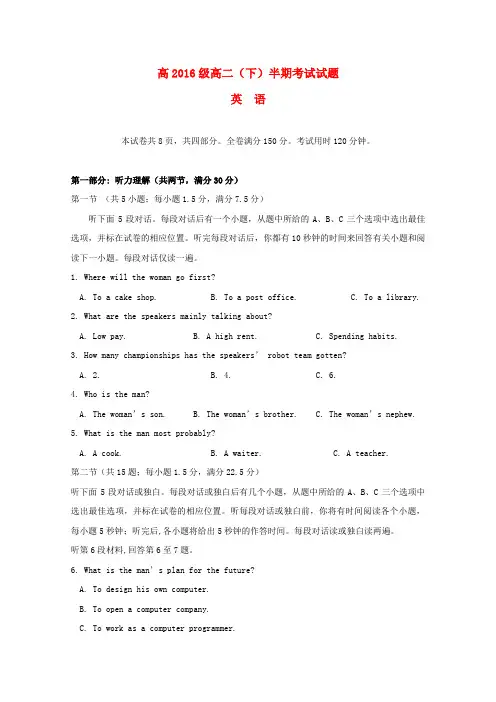
高2016级高二(下)半期考试试题英语本试卷共8页,共四部分。
全卷满分150分。
考试用时120分钟。
第一部分: 听力理解(共两节,满分30分)第一节(共5小题;每小题1.5分,满分7.5分)听下面5段对话。
每段对话后有一个小题,从题中所给的A、B、C三个选项中选出最佳选项,并标在试卷的相应位置。
听完每段对话后,你都有10秒钟的时间来回答有关小题和阅读下一小题。
每段对话仅读一遍。
1. Where will the woman go first?A. To a cake shop.B. To a post office.C. To a library.2. What are the speakers mainly talking about?A. Low pay.B. A high rent.C. Spending habits.3. How many championships has the speakers’ robot team gotten?A. 2.B. 4.C. 6.4. Who is the man?A. The woman’s son.B. The woman’s brother.C. The woman’s nephew.5. What is the man most probably?A. A cook.B. A waiter.C. A teacher.第二节(共15题;每小题1.5分,满分22.5分)听下面5段对话或独白。
每段对话或独白后有几个小题,从题中所给的A、B、C三个选项中选出最佳选项,并标在试卷的相应位置。
听每段对话或独白前,你将有时间阅读各个小题,每小题5秒钟;听完后,各小题将给出5秒钟的作答时间。
每段对话读或独白读两遍。
听第6段材料,回答第6至7题。
6. What is the man’s plan for the future?A. To design his own computer.B. To open a computer company.C. To work as a computer programmer.7. What will the man have to do from now on?A. Study hard.B. Help his uncle.C. Look after his parents.听第7段材料,回答第8至9题。
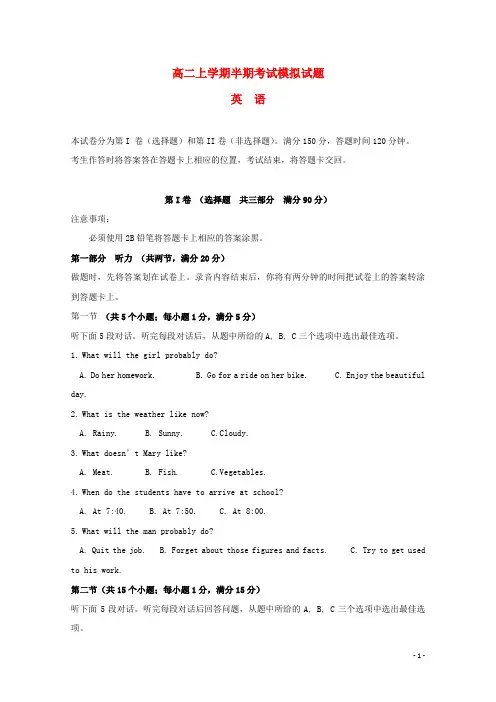
高二上学期半期考试模拟试题英语本试卷分为第I 卷(选择题)和第II卷(非选择题)。
满分150分,答题时间120分钟。
考生作答时将答案答在答题卡上相应的位置,考试结束,将答题卡交回。
第I卷(选择题共三部分满分90分)注意事项:必须使用2B铅笔将答题卡上相应的答案涂黑。
第一部分听力(共两节,满分20分)做题时,先将答案划在试卷上。
录音内容结束后,你将有两分钟的时间把试卷上的答案转涂到答题卡上。
第一节(共5个小题;每小题1分,满分5分)听下面5段对话。
听完每段对话后,从题中所给的A, B, C三个选项中选出最佳选项。
1.What will the girl probably do?A. Do her homework.B. Go for a ride on her bike.C. Enjoy the beautiful day.2.What is the weather like now?A. Rainy.B. Sunny.C.Cloudy.3.What doesn’t Mary like?A. Meat.B. Fish.C.Vegetables.4.When do the students have to arrive at school?A. At 7:40.B. At 7:50.C. At 8:00.5.What will the man probably do?A. Quit the job.B. Forget about those figures and facts.C. Try to get used to his work.第二节(共15个小题;每小题1分,满分15分)听下面5段对话。
听完每段对话后回答问题,从题中所给的A, B, C三个选项中选出最佳选项。
听第6段材料,回答第6至8题。
6.What’s the relationship between the speakers?A. They are friends.B. They are partners.C. They are strangers.7.Why does Elva Miller ring Mr. Smith?A. She wants to get his address.B. She wants him to help her.C. She wants to see him.8.Where will they meet each other?A. At the post office.B. In Mr. Smith’s home.C. In Mr. Smith’s office.听第7段材料,回答第9至11题。
高2014级高二下期3月教学质量检测题英语本试题卷分第Ⅰ卷(选择题)和第Ⅱ卷(非选择题)。
考生作答时,须将答案答在答题卡上,在本试题卷、草稿纸上答题无效。
满分150分。
考试时间120分钟。
考试结束,将本试卷和答题卡一并交回。
第Ⅰ卷(共三部分,满分100分)注意事项:1.必须使用2B铅笔在答题卡上将所选答案对应的标号涂黑。
2.第I卷共三部分,共计100分。
第一部分听力(共两节,共30分)做题时,先将答案划在试卷上。
录音内容结束后,你将有两分钟的时间将试卷上的答案转涂到答题卡上。
第一节(共5 小题;每小题1.5分,共7.5分)听下面5段对话。
每段对话后面有一个小题,从题中所给的A、B、C三个选项中选出最佳选项,并标在试卷的相应位置。
听完每段对话后,你都有10秒钟的时间来回答有关小题和阅读下一小题。
每段对话仅读一遍。
第一节(共5小题;每小题1.5分,满分7.5分)请听下面5段对话,选出最佳选项。
例:How much is the shirt?A.£19.15B. £.9.15 C . £9.18 答案是B.1. What does the man like about the play?A. The storyB. The endingC. The actor2. Which place are the speakers trying to find?A. A hotel.B. A bank.C.A restaurant.3. At what time will the two speakers meet?A. 5:20.B.5:10.C.4:40.4. What will the man do?A. Change the plan.B. Wait for a phone.C. Sort things out.5. What does the woman want to do?A. See a film with the man .B. Offer the man some help.C. Listen to some great music.第二节(共15小题;每题1.5分,共22.5分)听下面5段对话或独白。
第一部分:听力(共两节,满分30分)第一节(共5小题;每小题1.5分,满分7.5分)听下面5段对话。
每段对话仅读一遍。
1.Where are the two speakers talking?A.In a barbershop. B. In a post office. C. In a restaurant.2.Why does the woman advise the man to give up smoking?A.Becaus e it’s a bad example to the children.B.Because it’s bad for his health.C.Because it’s a real pleasure.3.What does the woman mean?A.She was quite pleased with the interview.B.She could have done better in the interview.C.She couldn’t a nswer some of the questions.4.What does the man suggest the woman do?A.Leave the hotel at 2:00 P. m.B.Go there 2 hours earlier.C.Avoid the rush hours traffic.5.Where has the man been?A.London. B.Paris. C.Both A and B.第二节(共15小题;每小题1.5分,满分22.5分)听下面5段对话或独白。
每段对话或独白读两遍。
听第6段材料,回答第6至8题。
6.What’s the possible relationship between the two speakers?A.Father and mother. B.Father and son. C.Mother and son.7.What do we know from the talk?A.They were waiting to see the White House.B.They just visited the White House.C.They just got to the White House.8. What did the boy wish to do at the White House?A. He wished to be a visitor.B. He wished to stay longer.C .He wished to get a reception.听第7段材料,回答第9至11题。
宜宾市高2014级高三(上)期中英语试题本试卷分第Ⅰ卷(选择题)和第Ⅱ卷(非选择题)两部分。
第Ⅰ卷第一部分听力(共两节,满分30分)第一节(共5 小题;每小题1.5分,满分7.5分)1. Where does the man plan to go in America?A. West.B. South.C. East.2. What does the woman mean?A. She can finish work on time.B. She may begin to work right now.C. Their computers are out of order.3. What do we learn about the two speakers?A. They knew each other when they lived in England.B. Both of them once lived in England.C. The woman once studied in England.4. Who’s in danger?A. Mrs. Hill’s daughter.B. Mr. Hill.C. Mrs. Hill.5. Where does the conversation most probably take place?A. At the bus stop.B. On a bus.C. At the railway station.第二节(共15小题;每题1.5分,满分22.5分)听下面一段对话, 回答第6和第7两个小题。
6. What can we learn from the conversation?A. Mike planned to travel with Celia.B. Mike will go sightseeing with Miguel.C. Celia planned to go on a trip with Miguel.7. What’s the possible relationship between Sue and Mike?A. Friends.B. Husband and wife.C. Strangers.听下面一段对话, 回答第8至第10三个小题。
四川省宜宾市第三中学2014-2015学年高二英语上学期试题(无答案)本试卷分第Ⅰ卷和第Ⅱ卷两部分。
共120分,考试时间100分钟。
不用涂卡。
第Ⅰ卷(三部分,共85分)第一部分:听力(略)第二部分:英语知识运用(共两节,满分45分)第一节:语法和词汇(共15小题:每小题1分,满分15分)从A、B、C、D四个选项中,选出可以填入空白处白处的最佳选项,并在答题卡上将该项涂黑。
21.—Hi.Danny! Are you going for a picnic this weekend?—I’m not .A.It all depends B.Yes.I’d like to C.Sounds good D.Sorry,I can’t 22.—How are they getting on?—All gets on well as___________.A.to be planned B.being planed C.planned D.planning 23.—Can you give me the right answer?─Sorry I________ .Would you repeat the question?A.hadn’t listen B.haven’t listened C.don’t listen D.wasn’t listening 24.The professor advised us to think outside the box and to________ new, different, or unusual solutions.A.put up with B.come up with C.keep up with D.catch up with25.In that south American country, _____bicycles are not_______ popular means of transportation.A.不填;a B.不填;不填C.the:the D.the;a26.─the plane to Beijing have taken off on time?—I’m afraid not.The fog was too thick then.A.Will B.Need C.Must D.Could27.You will see this product made in this factory________ wherever you go.A.to be advertised B.advertised C.advertise D.advertising28.________we have seems less important than ________we have got .A What, what.B.That, what C.What, that D.That, that29.The achievements of the greatest minds in science could never have been reached if it had not been the ________ work of hundreds of others.A.patients B.patiently C.patient D.patience30.She spoke very confidently because she wanted to make a great__________ on her employer.A.influence B.pressure C.impression D.effect31.It is because English is being widely used at present_________.A.why we learn it hard B.that we learn it hardC.which we must learn D.when we should learn32.________to give up smoking,he threw away his________ cigarettes.A.Determined;remained B.Determined;remaining C.Determining;remained D.Determining;remaining33.Was it midnight_________ you fell asleep while reading with the candle still burning? A.when B.then C.that D.in which 34.—We’d better_______ if we want to be on time.—OK.A.sweep up B.use up C.speed up D.set up35.Most of the students near______ Tom was sitting appeared to be taking notes.So he pretended to do the same.A.which B.that C.whom D.where第二节:完形填空(共20小题;每小题分,满分30分)阅读下面短文,掌握其大意,然后从36─55各题所给的四个选项(A、B、C和D)中选出最佳选项,并在答题卡上将该项涂黑。
宜宾市高中协同提升责任区2014-2015学年高二上期中联合测试英语试题(考试时间:120分钟;总分为:150分)本试卷分为第I卷和第II卷两局部须知事项:〔1〕答题前,务必将自己的姓名、某某号、考试科目等涂写在试卷和答题卡指定的位置。
〔2〕第I卷、第II卷的答案务必答在答题卡上。
假设答在试卷上,将被视为无效。
每一小题选出答案后,用铅笔把答题卡上对应题目的答案标号涂黑。
如需改动,用橡皮擦干净后,再选涂其他答案标号。
第I卷选择题〔共90分〕第一局部听力〔共两节,共20分〕做题时,先将答案划在试卷上。
录音内容完毕后,你将有两分钟的时间将试卷上的答案转涂到答题卡上。
第一节 (共5小题; 每一小题1分, 共5分)听下面5段对话。
每段对话后面有一个小题,从题中所给的A、B、C三个选项中选出最优选项,并标在试卷的相应位置。
听完每段对话后,你都有10秒钟的时间来回答有关小题和阅读下一小题。
每段对话仅读一遍。
1. What does the man think the new tall building might be?A. A market.B. A hotel.C. A department store.2. Which city does the woman prefer living in?A. Paris.B. New York.C. San Francisco.3. What is the weather like according to the dialogue?A. Rainy.B. Sunny.C. Windy.4. Why does the man call the police?A. A fire broke out in the street.B. There was a traffic accident in the street.C. There was a fight in the street.5. What does the woman want to find?A. A new computer.B. A used computer.C. A newspaper.第二节(共15小题; 每一小题1分,总分为15分)请听下面5段对话或独白,选出最优选项。
高2014级高二下期中考试英语试题(考试时间:120分钟;满分:150分) 本试卷分为第I卷和第II卷两部分第Ⅰ卷注意事项:1. 答第Ⅰ卷前,考生务必将自己的姓名、准考证号填写在答题卡上。
2. 选出每小题答案后,用铅笔把答题卡上对应题目的答案标号涂黑。
如需改动,用橡皮擦干净后,再选涂其他答案标号。
不能答在本试卷上,否则无效。
第一部分听力(共两节,满分30分)做题时,先将答案标在试卷上。
录音内容结束后,你将有两分钟的时间将试卷上的答案转涂到答题卡上。
第一节(共5 小题;每小题1.5分,共7.5分)听下面5段对话。
每段对话后有一个小题,从题中所给的A、B、C三个选项中选出最佳选项,并标在试卷的相应位置。
听完每段对话后,你都有10秒钟的时间来回答有关小题和阅读下一小题。
每段对话仅读一遍。
1. What is the probable relationship between the two speakers?A. A teacher and a student.B. A student and her classmate.C. A teacher and her workmate.2. Where are they standing now?A. Outside a book shop.B. In a clothes shop.C. In front of a clothes shop.3. By what time does the man have to check his ticket?A. 12:05 p.m.B. 12:45 p.m.C. 11:35 a.m.4. What caused the man’s red eyes?A. Sadness.B. Sand.C. Some eye disease.5. What sunglasses does the man want to buy?A. Brown ones.B. Black ones.C. Glasses of any color.第二节(共15题。
高二上学期半期考试模拟试题英语本试卷分为第I 卷(选择题)和第II卷(非选择题)。
满分150分,答题时间120分钟。
考生作答时将答案答在答题卡上相应的位置,考试结束,将答题卡交回。
第I卷(选择题共三部分满分90分)注意事项:必须使用2B铅笔将答题卡上相应的答案涂黑。
第一部分听力(共两节,满分20分)做题时,先将答案划在试卷上。
录音内容结束后,你将有两分钟的时间把试卷上的答案转涂到答题卡上。
第一节(共5个小题;每小题1分,满分5分)听下面5段对话。
听完每段对话后,从题中所给的A, B, C三个选项中选出最佳选项。
1.What will the girl probably do?A. Do her homework.B. Go for a ride on her bike.C. Enjoy the beautiful day.2.What is the weather like now?A. Rainy.B. Sunny.C.Cloudy.3.What doesn’t Mary like?A. Meat.B. Fish.C.Vegetables.4.When do the students have to arrive at school?A. At 7:40.B. At 7:50.C. At 8:00.5.What will the man probably do?A. Quit the job.B. Forget about those figures and facts.C. Try to get used to his work.第二节(共15个小题;每小题1分,满分15分)听下面5段对话。
听完每段对话后回答问题,从题中所给的A, B, C三个选项中选出最佳选项。
听第6段材料,回答第6至8题。
6.What’s the relationship between the speakers?A. They are friends.B. They are partners.C. They are strangers.7.Why does Elva Miller ring Mr. Smith?A. She wants to get his address.B. She wants him to help her.C. She wants to see him.8.Where will they meet each other?A. At the post office.B. In Mr. Smith’s home.C. In Mr. Smith’s office.听第7段材料,回答第9至11题。
9.What is the man?A. A student.B. A policeman.C. A postman.10.How long hasn’t the man got a letter from his mother?A. Nearly a month.B. Nearly two weeks.C. Nearly a week.11.What will the man do next?A. Go to the bookstore.B. Go to the post office.C. Get online. 听第8段材料,回答第12至14题。
12.What is the man ?A. A teacher.B. A lawyer.C. A university student.13.What does the woman plan to do?A. Become a lawyer.B. Go to university.C. Find an easy job.14.What did the man’s father want him to be?A. A lawyer.B. A doctor.C. A manager.听第9段材料,回答第15至17题。
15.Why does the girl keep a weather diary?A. It’s useful for her studies.B. She’s going to have it published.C. She has great interest in the changing weather.16. What was the weather like on the morning of April 38th?A. Sunny.B. Cloudy.C. Rainy.17.What does the girl want to be when she finishes school?A. A journalist.B. A weather reporter.C. A writer.听第10 段材料。
回答第18至20题。
18.How long have the speaker and the Kemps been neighbours?A. For five years.B. For fifteen years.C. For fifty years.19.What happened to the Kemps’ house?A. It caught fire twice.B. It fell down twice.C. It was destroyed twice.20.Who told the police to come and ask the speaker to put out the fire?A. Some passers-by.B. His neighbour Mr. Kemp.C. Nobody, but the police smelt the fire.第二部分英语知识运用(共两节,满分40分)第一节:单项填空(共10小题;每小题1分,满分10分)从A、B、C、D四个选项中,选出可以填入空白处的最佳选项,并在答题卡上将该项涂黑。
21.Stephen Hawking, brilliant scientist, is giving a lecture about black holes in space.A./;the B.a;the C.a;/ D./;/22.All the experts attending the conference thought that the key to the air pollution problemwas to the wasted gas.A. solving ; reduceB. solving ; reducingC. solve ; reduceD. solve ; reducingke Tianchi is the highest volcanic lake in the world , an area of more than ten squarekilometers.A.coversB. coverC. to coverD. covering24.In the US, an country, English is not the only language.A. English-speaking ; speakingB. English-speaking ; spokenC. English-spoken ; speakingD. English-spoken ; spoken25. you do for others but not for yourself is the real happiness, and you should not carewhether it is small or big.A.No matter whatB. No matter howC. WhateverD. However26.My money . I must go to the bank to draw some of my savings out beforeI have nonein hand.A. has run outB. is running outC. has been run outD. is being running out27. ---- Guess what? I have got an A for my term paper.---- Great! You read widely and put a lot of work into it.A. mustB. shouldC. must haveD. should have28.In a totally immersed(封闭)school, all the students are forbidden during the study timeunless they get the special permission which allows .A. to go out ; to go outB. going out ; going outC. going out ; to go outD. to go out ; going out29.Bears fat stores throughout the summer and fall to have energy enough to last themthrough their winter sleep.A. build upB. pack upC. bring upD. take up30.If you want to get a higher score in a test, you’d better your papers before you handthem in.A. get throughB. get acrossC. go acrossD. go through第二节:完形填空(共20小题;每小题1.5分,满分30分)阅读下面短文,掌握其大意,然后从31-50题所给的四个选项(A, B, C和D)中选出可以填入空白处的最佳选项,并将答题卡上相应的选项涂黑。
“Who did this?” asked my teacher. Thirty children tried to 31 what they had done. “Who did this?” asked my teacher once more. She wasn’t really asking, she was demanding a(n) 32 . She seldom became 33 , but she was this time. She held up a piece of glass and asked, “Who 34 this window?” Unfortunately, Iwas the one who broke the window. I had not done it 35 . It was caused by an errant (偏离的) throw of a baseball. Why did it have to be me? If I admitted guilt, how would I be able to pay for a big 36 like that? I didn’t want to confess (坦白) it, but something strong inside my body made me 37 my hand. I told the 38 . “I did it.” I said no more. My teacher went to one of our library shelves and took down a 39 . She then began walking towards me. I knew my teacher had never 40 a student, but I 41 she was going to start with me and she was going to use a book for the swatting(重击). “I know how you like 42 ,” she said as she stood looking down at my guilt-ridden face. “Here is that book about birds that you constantly 43 out. It is yours. It’s time we get a(n) 44 one for the school anyway. The book is yours and you will not be 45 as long as you remember thatI am not rewarding you for your misdeed, but I am rewarding you for your 46 .”I couldn’t 47 it! I wasn’t being punished, and I was getting my favorite book, the 48 one that I had been saving up money to buy! What happened that day has deeply rooted in my memory and the 49 my teacher taught me that day will last 50 .31. A. look after B. think about C. get over D. look over32. A. letter B. problem C. question D. answer33. A. excited B. happy C. angry D.sorry34. A. broke B. opened C. closed D. repaired35. A. in demand B. by accident C. on purpose D. on time36. A. door B. window C. plate D. table37. A. give B. hold C. change D. raise38. A. truth B. secret C. lie D. question39. A. map B. picture C. book D. cartoon40. A. fired B. beaten C. helped D. warned41. A. wondered B. explained C. regarded D. feared42. A. fish B. birds C. pets D. animals43. A. put B. take C. check D. watch44. A. new B. strange C. old D. beautiful45. A. fined B. punished C. taught D. found46. A. progress B. dream C. honesty D. study47. A. accept B. refuse C. guess D. believe48. A. very B. little C. nice D. big49. A. art B. lecture C. lesson D. method50. A. never B. forever C. ever D. still第三部分阅读理解(共15小题;每小题2分,满分30分)阅读下列短文,从每题所给的四个选项(A、B、C、D)中,选出最佳选项,并在答题卡上将该项涂黑。